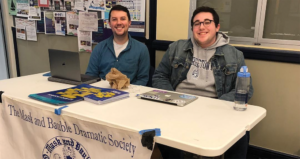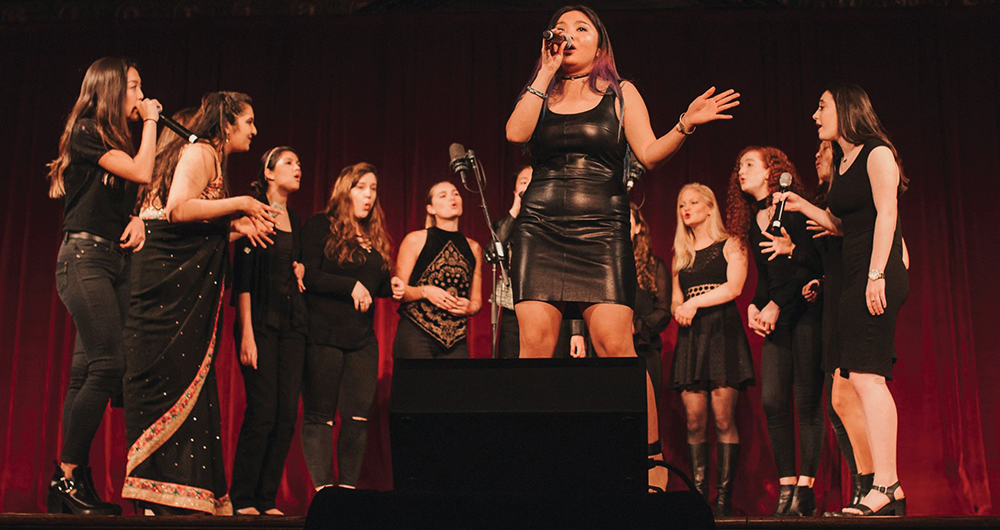Whether through the theater and performance studies program or student-run groups like the Mask and Bauble Dramatic Society, GU Black Theatre Ensemble and Nomadic Theatre, theater productions help shape the experiences of many students by creating a channel for success outside of the academic sphere and providing new, daring opportunities for expression.

Though productions may only run for a few nights, these performances require a rigorous creative process that demands much from its organizers and performers. The preparation requires intense commitment of time and energy from all involved, but the end result constitutes a genuine professional accomplishment, according to Mark Camilli (COL ’19), the director of “Speech and Debate,” a co-production between Mask and Bauble and TPSP.
“It was me working with my closest friends to put on a project that I put my heart and soul into for not just the three months we were rehearsing, but also the five months before that,” Camilli said. “Some people might write a thesis in their major, but to me the show was not just a social, community achievement, but really an academic one.”
The intensive time commitment often lends itself well to forming tight-knit groups of creative and dedicated classmates and professors, according to Charlie Trepany (COL ’19), a theater and performance studies major who has worked with TPSP over his past four years at Georgetown.
“I’ve been acting in shows with this department since my freshman year and have learned so much from working with the incredible faculty, as well as collaborating with my fellow students,” Trepany wrote in an email to The Hoya. “These shows are huge time commitments and so fulfilling to be a part of, and each cast always gets so close during each rehearsal process.”
Theater allows students to discover a place not only where they belong on campus, but also where they can deeply and personally reflect, according to Camilli.
“Without theater especially, I feel like I wouldn’t have a place here; to me, that’s where I found my home, my friends, my community, and also where I found out the most about myself,” Camilli said.
These artistic communities have the potential to form long-lasting, sustainable networks of collaboration and creativity, according to Lianna McFarlane-Connelly (COL ’19), a set designer who has worked with Nomadic.
“We had the end of the year party this year and the room was filled with almost a completely new set of artists than were here when I joined, and they are all committed to pushing the organization and collaborating as artists,” McFarlane-Connelly wrote in an email to The Hoya.
With the entrance of new students each year, the nature of this collaborative art form is constantly in flux on campus, according to McFarlane-Connelly.
“We constantly push the boundaries of what we can do theatre-wise on campus. Our community is really always looking to do better, so we really face challenges daily,” wrote McFarlane-Connelly.
To succeed as a theater company, the company must face the creative and logistical needs of both its productions and its members, according to McFarlane-Connelly.
“Some challenges are how to create a better work environment where we can all pursue our goals as artists, some are more about access to physical space, or economic access, really everything about trying to be a theatre company on a college campus.”
Navigating the challenges present in theater on campus helps students learn a valuable set of skills for approaching new problems and having difficult conversations; working to execute a distinct creative vision for a show by collaborating with castmates leaves students with a sense of pride and personal fulfillment, according to Trepany.
“I think the show I’m most proud of acting in was Our Class, which was directed by Professor Derek Goldman last semester,” wrote Trepany. “The material was so heavy and challenging to act, but I’m so proud of the trust the student cast had for each other, as well as the maturity and professionalism we brought to the work. Every rehearsal, I was so moved by how bravely each cast member acted these difficult and vulnerable scenes.”
Likewise, the skills that a production develops can provide vital resources to students in any endeavor they pursue, whether it directly applies to theater or not, according to Camilli.
“Surprisingly enough, you gain a lot of creative skills, critical thinking skills, leadership skills, and I find myself in a lot of job or internship interviews citing a lot of what I did in theater even though that’s not my main academic area of focus,” Camilli said.
Theater creates a space for students to express their creativity and opens new ways of seeing the world that persists even after their time at Georgetown, according to Trepany.
“I think what’s great about acting is that it gives you an openness and an appreciation for the present moment,” wrote Trepany. “The best acting happens when you’re not anticipating what’s going to happen next, when you’re just living truthfully and letting the moments take you wherever they end up taking you.”
















